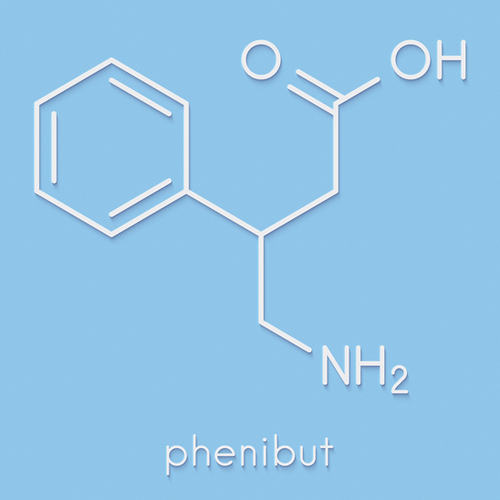
Phenibut
Scientific names: Beta-phenyl-gamma-aminobutyric acid
Alternate names: 4-Amino-3-Phenylbutyric Acid, Acide 4-Amino-3-Phenylbutyrique, Acide Bêta-Phényl-Gamma-Aminobutyrique, Agente Gabaérgico, B-(Aminomethyl)-Benzenepropanoic Acid, Beta-(Aminomethyl)-Hydrocinnamic Acid, B-Phenyl-Gamma-Aminobutyric Acid, Beta-Phenyl-GABA, Bêta-Phényl-GABA, Beta-Phenyl-Gamma-Aminobutyric Acid, Fenibut, Phénibut, Phenigam, PhGaba, Phenigamma, Phenygam, Phenyl-GABA, Phényl-GABA
Actions: Alcohol, Cardiovascular, Circulation, Neurologic
Background
Phenibut is a chemical similar to a brain chemical called gamma-aminobutyric acid (GABA). It's used recreationally and as a drug in Russia. It may be unsafe.
Phenibut might decrease anxiety and have other effects on the body, but most research on phenibut has been published in Russia.
People use phenibut for anxiety, alcohol use disorder, insomnia, depression, stress, and many other conditions, but there is no good scientific evidence to support these uses.
Phenibut is approved for use in Russia and some Eastern European countries. Due to safety concerns, it's not approved in the US for use in dietary supplements. Don't confuse phenibut with GABA. These are not the same.
Phenibut might decrease anxiety and have other effects on the body, but most research on phenibut has been published in Russia.
People use phenibut for anxiety, alcohol use disorder, insomnia, depression, stress, and many other conditions, but there is no good scientific evidence to support these uses.
Phenibut is approved for use in Russia and some Eastern European countries. Due to safety concerns, it's not approved in the US for use in dietary supplements. Don't confuse phenibut with GABA. These are not the same.
Safety Safety definitions
When taken by mouth: Phenibut is likely unsafe. Phenibut can cause many side effects, including reduced consciousness, dizziness, nausea, poor balance, and fatigue. Taking large doses can cause trouble breathing, unconsciousness, and death.
Phenibut can cause dependence. People who use phenibut for 3 days or more and then stop taking it might experience withdrawal symptoms. These symptoms can include decreased appetite, nausea, muscle aches, fast heart rate, anxiety, agitation, trouble sleeping, seizures, and delirium.
Phenibut can cause dependence. People who use phenibut for 3 days or more and then stop taking it might experience withdrawal symptoms. These symptoms can include decreased appetite, nausea, muscle aches, fast heart rate, anxiety, agitation, trouble sleeping, seizures, and delirium.
Special Precautions & Warnings:
Pregnancy and breast-feeding: There isn't enough reliable information to know if phenibut is safe to use when pregnant or breast-feeding. Stay on the safe side and avoid use.Effectiveness
Effective Effectiveness definitions
There is interest in using phenibut for a number of purposes, but there isn't enough reliable information to say whether it might be helpful.
Dosing & administration
Despite being banned in the US, phenibut is still found in some dietary supplements. Most products containing phenibut are sold online. Taking phenibut is unsafe and can lead to dependence and withdrawal.
Interactions with pharmaceuticals
Pregabalin (Lyrica)
Interaction Rating=Moderate Be cautious with this combination.
Phenibut acts on the brain in a similar way to pregabalin. Taking these two chemicals together might increase the risk for side effects.
Sedative medications (CNS depressants)
Interaction Rating=Moderate Be cautious with this combination.
Phenibut might cause sleepiness and slowed breathing. Some medications, called sedatives, can also cause sleepiness and slowed breathing. Taking phenibut with sedative medications might cause breathing problems and/or too much sleepiness.
Interactions with herbs & supplements
Herbs and supplements with sedative properties: Phenibut might cause sleepiness and slowed breathing. Taking it along with other supplements with similar effects might cause too much sleepiness and/or slowed breathing in some people. Examples of supplements with this effect include hops, kava, L-tryptophan, melatonin, and valerian.
Interactions with foods
There are no known interactions with foods.
vital.ly has licensed monographs from TRC Healthcare.
This monograph was last reviewed on 03/10/2024 10:00:00 and last updated on 14/10/2020 02:17:26. Monographs are reviewed and/or updated multiple times per month and at least once per year.
Natural Medicines disclaims any responsibility related to medical consequences of using any medical product. Effort is made to ensure that the information contained in this monograph is accurate at the time it was published. Consumers and medical professionals who consult this monograph are cautioned that any medical or product related decision is the sole responsibility of the consumer and/or the health care professional. A legal License Agreement sets limitations on downloading, storing, or printing content from this Database. No reproduction of this monograph or any content from this Database is permitted without written permission from the publisher. It is unlawful to download, store, or distribute content from this site.




